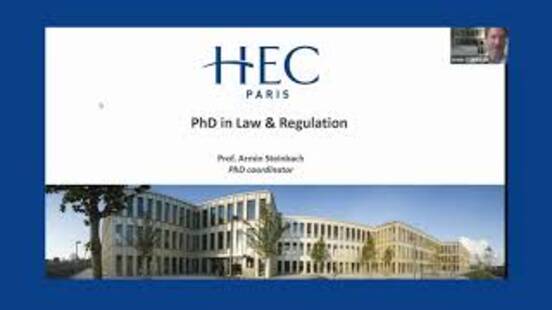Law and Regulation
The PhD in Law and Regulation is designed to pursue PhD research at the intersection of law, social sciences, business and technology.
The PhD in Law and Regulation is designed to pursue PhD research at the intersection of law, social sciences, business and technology at HEC Law and Tax Department. This vibrant academic environment allows PhD students to grow as researchers and obtain jobs in top academic institutions at the end of the PhD program.
Why join us
The PhD in Law and Regulation is an intensive scholarly program aiming to attract outstanding global students with the highest level of ambition. The program admits only 1 to 2 students every year. It offers a tailored learning journey, which combines methodological and substantive training, as well as close, interdisciplinary supervision.
Tracks
The PhD in Law and Regulation offers two alternative PhD tracks:
- The 3-year doctoral studies track is open to students holding a master degree in Law. In year one, students are required to take 100 hours of courses choosing from a range of legal and non-legal courses. They also work on their research paper-based dissertation as from year one.
- The 5-year studies track (two phases) is open to students holding at minimum a bachelor degree (either bachelor of law or other bachelor degree with minimum exposure to legal studies).
Phase 1: In year one and two, students take courses for up to 120 ECTS and are awarded the Master in Management Sciences while working on defining their PhD dissertation subject. Students may choose classes offered in Law at the Master's level, from specializations other than Law, or at other Parisien universities (upon agreement with these universities). Phase 2: In the following three years students work on their research paper-based dissertation as from year one.
In both tracks, we also encourage academic exchanges with the world’s leading business schools and support research presentations in academic conferences.
Read more about the PhD program curriculum here.
Research focuses
The Law and Tax Department conducts research at the intersection of law, social sciences, business and technology. Its faculties’ research spans across multiple legal fields such as corporate and tax law, European and transnational law, and fundamental rights, and covers topics such as sustainability and corporate social responsibility, diversity and inclusiveness, law and economics, artificial intelligence and the blockchain, financial regulation, and governance. The outputs of their research is regularly published in top-tier academic journals and media outlets.
Research seminars
The department currently hosts three research seminar series: The Law and Regulation Series -- The Law, Society & AI Seminar Series -- The Law and Economics Research Series.
About the department
The Law and Tax Department comprises of 12 professors and a team of affiliates who conduct research and are involved in teaching and supervising throughout all programs of HEC Paris, spanning the Grande Ecole, the MBA, the Executive Education, and the PhD program. The Department also runs three full time programs: an LLM in International Management and Law, a Major in International Taxation and Legal Strategy, and a Major in European Business Law and Global Affairs. These programs offer lively and hands-on courses to law students in collaboration with major Parisian and international law firms, companies and civil society organizations. Department website




